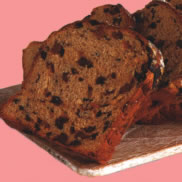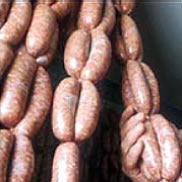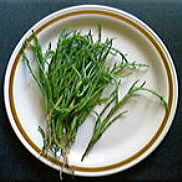- Home
- Applied Ability Awards
The GBK CookbookThe British Food TrustOther    After over 10 years of providing this website as an entirely free service the Trust now hopes that small donations from our viewers will allow the site to continue beyond 2013. |
Lincolnshireby Helen Gaffney"Lincolnshire, maritime county in East of England, bounded North by Yorkshire, from which it is separated by the Humber; East by the North Sea; South by Northamptonshire, Cambridgeshire, and Norfolk; and West by Nottinghamshire, Leicestershire, and Rutland. Lincolnshire is the second largest county in England. For a very long time it has been divided into 3 'parts' -namely, the Parts of Lindsey, Kesteven, and Holland. Generally speaking the land is flat and low, especially on the coast, which in some parts requires an embankment to check the encroachments of the sea. The Wolds, or Chalk Hills, in the Northeast, are about 47 miles long and 6 miles broad." From Bartholomew's Gazetteer of the British Isles, 1887 Lincolnshire Plum Bread Lincolnshire is one of the easternmost counties of England, famous for growing spring bulbs and early vegetables in the flat fertile fields of much of the county. Lincoln is a beautiful city - the steep cathedral hill simply takes your breath away. To the south-west is the town of Grantham, famous as the birthplace of the former prime minister, Margaret Thatcher. Boston and Spalding are all well-known, as are the holiday towns of Skegness and Cleethorpes and the fishing town of Grimsby.
Just as with plum pudding or plum cake, the word 'plum' in Plum Bread means dried fruit, in this case currants, raisins and sultanas. There are several of these plum breads - fruited breads - sold in supermarkets, distributed by a variety of producers. However, the Lincolnshire Plum Bread seems to be the best known. This is widely available but visitors to Lincolnshire should try, if possible, to sample the non-commercial version, as baked by smaller specialist bakers.
Another of the county's meat specialities is Stuffed Chine - salt pork filled with herbs. A Mr. Verlaine spent a year as a schoolmaster just north of Boston, in the mid-1870s, he liked chine so much that he tried to find it elsewhere in England, but without success. A chine is a square block of meat, cut from between the shoulder blades across the backbone, pink in colour from the cure. Verlaine's chine was stuffed with leeks, spring onions, lettuce, raspberry leaves, parsley, thyme and marjoram. Nowadays parsley is sufficient, but you will need a great deal. Although most of the agricultural land is arable, Lincolnshire's dairy herds from the Wolds provide high quality milk, some of which goes into the excellent cheeses available from the County. One of these is Lincolnshire Poacher made by F. W. Read and Sons. This is an unpasteurised cheese from a traditional recipe, handmade between the months of October and May. It is not made in the summer months mainly because the majority of the herd calve in autumn, so most of the cows are producing little milk in the summer. It is a full bodied cheese, well rounded in flavour, resembling a cheddar but with a bitter sweet bite and a long after-taste. Lincolnshire Poacher was judged to be of Gold Medal standard at the British Cheese Awards in 2001.
Another Lincolnshire speciality is Samphire, a succulent, bright green plant with a woody 'skeleton', found on marshland. The plant is boiled and served with salt and plenty of vinegar. When it is in season, people head down to the marshes of Lincolnshire to pick Samphire and it can be quite a family occasion, equivalent to mushroom picking in France. Samphire was served at the wedding breakfast of Prince Charles and Lady Diana Spencer. The county is also home to an excellent brewery - Batemans, which began brewing in 1874. At that time, there was only one draught beer brewed, but by 1960 there were eight - three draughts (a light mild, dark mild and XB bitter) and five bottled beers (IPA, Nut Brown, Dinner Ale and B.B.B). In October 1987, to celebrate the end of the "Battle for Independence" and in conjunction with CAMRA (Campaign for Real Ale), a beer known as Victory Ale was brewed. Lincolnshire is proud of its traditions and all these foods are found here still, from Grimsby Fish to Grantham Gingerbread. |
||




 Top of page
Top of page
 Previous page
Previous page